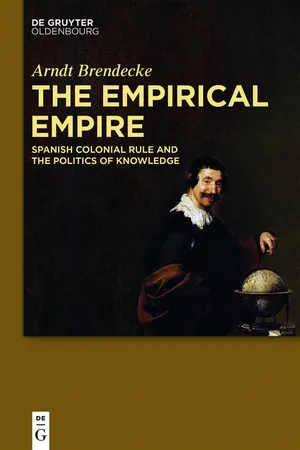
- 333 pages
- English
- ePUB (mobile friendly)
- Available on iOS & Android
eBook - ePub
About this book
How was Spain able to govern its enormous colonial territories? In 1573 the king decreed that his councilors should acquire "complete knowledge" about the empire they were running from out of Madrid, and he initiated an impressive program for the systematic collection of empirical knowledge. Brendecke shows why this knowledge was created in the first place – but then hardly used. And he looks into the question of what political effects such a policy of knowledge had for Spain's colonial rule.
Tools to learn more effectively

Saving Books

Keyword Search

Annotating Text

Listen to it instead
Information
Appendix
1 Abbreviations
| ACA | Archivo de la Corona de Aragón |
| AGI | Archivo General de Indias |
| AGN | Archivo General de la Nación |
| AGS | Archivo General de Simancas |
| AHN | Archivo Histórico Nacional |
| BFZ | Biblioteca Francisco Zabálburu |
| BL | British Library, London |
| BME | Biblioteca del Monasterio de El Escorial |
| BNE | Biblioteca Nacional de España |
| BPR | Biblioteca de Palacio Real |
| BPT | Biblioteca Pública, Toledo |
| CODOIN–1 | Colección de documentos inéditos relativos al descubrimiento, conquista y colonización de las antiguas posesiones españolas de América y Oceania. Madrid 1864–1884, ND Vaduz 1964–1966. |
| CODOIN–2 | Colección de documentos inéditos relativos al descubrimiento, conquista y organización de las antiguas posesiones españolas de ultramar. Segunda serie. 25 Bde. Madrid 1885–1932, ND Nendeln 1967. |
| CODOIN–3 | Colección de documentos inéditos para la historia de Hispano-América. Madrid 1927–1932. |
| CODOIN–E | Colección de documentos inéditos para la historia de España. 112 Bde. Madrid 1842–1895. |
| CODODES | Colección documental del descubrimiento (1470–1506). 3 Bde. Madrid 1994. |
| IVDJ | Instituto Valencia de Don Juan |
| NCODOIN | Nueva colección de documentos inéditos para la historia de España y de sus Indias. 6 Bde. Madrid 1892–1896. |
| RAH | Real Academia de la Historia |
2Printed sources
Abril Stoffels, Miguel J., ed. “Junta Magna de 1568, resoluciones e instrucciones [fundación de la inquisición limeña]” In Francisco de la Cruz: Inquisición: Actas II, 1, edited by Miguel J. Abril Stoffels and Vidal Abril Castelló, 129–194. Madrid: CSIC, 1996.
Acuña, René, ed. Relaciones geográficas del siglo XVI. 10 vols. Mexico City: UNAM, 1982–1988.
Albertinus, Aegidius. Emblemata hieropolitica versibus et prosa illustrabat Ioannes Melitanus a Corylo, Cologne: Konstantin Münich, 1647.
Arias Montano, ...
Table of contents
- Cover
- Title Page
- Copyright
- Dedication
- Contents
- Introduction
- I The king – all-seeing and blind
- II Knowledge as the ruler’s postulate
- III Strolls through the world. The epistemic setting of the court
- IV The authorities of colonial rule
- V Knowledge in the setting of colonial rule
- VI Entera noticia: Ovando’s project of complete knowledge
- VII Practices of knowledge acquisition
- VIII Consulting: scenarios for the application of knowledge
- IX Conclusions
- Appendix
- Endnotes
Frequently asked questions
Yes, you can cancel anytime from the Subscription tab in your account settings on the Perlego website. Your subscription will stay active until the end of your current billing period. Learn how to cancel your subscription
No, books cannot be downloaded as external files, such as PDFs, for use outside of Perlego. However, you can download books within the Perlego app for offline reading on mobile or tablet. Learn how to download books offline
Perlego offers two plans: Essential and Complete
- Essential is ideal for learners and professionals who enjoy exploring a wide range of subjects. Access the Essential Library with 800,000+ trusted titles and best-sellers across business, personal growth, and the humanities. Includes unlimited reading time and Standard Read Aloud voice.
- Complete: Perfect for advanced learners and researchers needing full, unrestricted access. Unlock 1.4M+ books across hundreds of subjects, including academic and specialized titles. The Complete Plan also includes advanced features like Premium Read Aloud and Research Assistant.
We are an online textbook subscription service, where you can get access to an entire online library for less than the price of a single book per month. With over 1 million books across 990+ topics, we’ve got you covered! Learn about our mission
Look out for the read-aloud symbol on your next book to see if you can listen to it. The read-aloud tool reads text aloud for you, highlighting the text as it is being read. You can pause it, speed it up and slow it down. Learn more about Read Aloud
Yes! You can use the Perlego app on both iOS and Android devices to read anytime, anywhere — even offline. Perfect for commutes or when you’re on the go.
Please note we cannot support devices running on iOS 13 and Android 7 or earlier. Learn more about using the app
Please note we cannot support devices running on iOS 13 and Android 7 or earlier. Learn more about using the app
Yes, you can access The Empirical Empire by Arndt Brendecke in PDF and/or ePUB format, as well as other popular books in History & European History. We have over one million books available in our catalogue for you to explore.